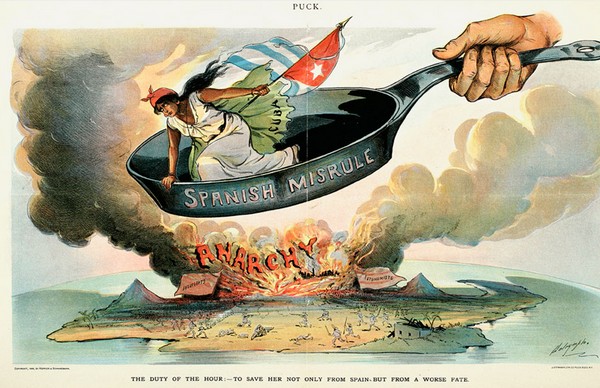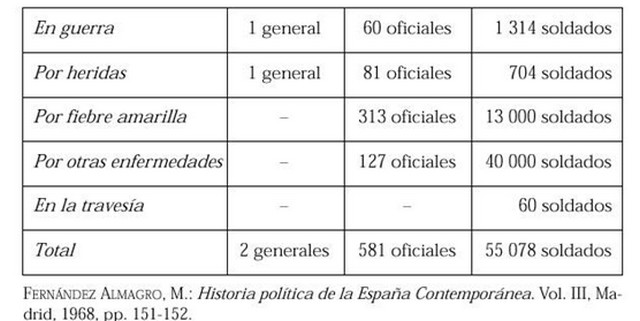Criteris correcció Cuba War
CUBA WAR
 |
Spanish Misrule: “The Duty of the Hour:— To Save Her Not Only from Spain but from a Worse Fate,”
Keppler & Schwarzmann, . Puck, 1898.Lithograph. New-York Historical Society.- link-
Source 1
|
SHOUTS IN SPAIN FOR CUBA. Rebel Demonstration During a Patriotic Play in Barcelona. BARCELONA, April 6 1896 The New York Times- link- |
Source 2
|
In accord with the Assembly of Representatives of the Revolution, a commission of Major General Calixto García, Colonel Manuel Sanguily, 10 November 1898-link- link- |
Source 3
|
Treaty of Paris of 1898.
Representatitves of Spain and the United States signed the Treaty of Peace in Paris. 10 December 1898-link- http://www.loc.gov/rr/hispanic/1898/chronology.html |
Source 4
 |
Read these sources and try to answer the following questions:
VER:
http://www.loc.gov/teachers/classroommaterials/primarysourcesets/spanish-american-war/
- Sources (6-7 lines) ( 2 points):
Source 1:
What kind of source is Source 1?(Classify and justify your answer).
primary, textual, public and political.
Source 2:
Explain the historical context of source 2.
"The U.S. instead stated that the U.S. had declared war on Spain"
The sinking of the Maine was the reason the U.S. declared war on Spain in 1898, but also the U.S. government did not recognize the Cuban commission when they ask for establishing a Cuban government.
Historical Spanish context: Ma Cristina Regency, as a mother of Alfonso XIII future king.
Praxedes M. Sagasta as a president of the government.(Cánovas was assassinated by an anarchist some years before) - Source 1,2 and 3:( 5-6 lines) (2 points)
Explain what did it happen with the Maine,
The sinking of the Maine was the reason the U.S. declared war on Spain in 1898 but the way the US acted showed the USA government intentions : Secretary of State John Hay called it a "splendid little war." and the Spanish-American War signaled the emergence of the US as a great power onto the world stage of international relations and diplomacy:the war did announce to the rest of the world that the US was now a major player.
The war also revealed the growing power of the media to control public opinion in the US(ylo journalism (, newspapermen like Hearst and Pulitzer practiced yellow journalism, sensationalizing stories and whipping the public into a frenzy for the simple purpose of increasing circulation.)
The Spanish-American War was very modern, arguably the first "media war" in American history.
Why did they say "To Save Her Not Only from Spain but from a Worse Fate,”?
•US responsibility to spread Christianity and “civilization” to the world’s “inferior peoples.” (democratize, educate...)
Illustrations simplified the message that yellow journalists like William Randolph Hearst wanted his readers to buy--Cuba was helpless and the U.S. must intervene:
•Political cartoons and drawings were popular features in 1890s newspapers and the yellow journals of the Spanish-American War era.•Before the Spanish-American War began, drawings depicting Spain as evil, Cuba as innocent, and President McKinley as a coward, helped rally sympathy for the Cuban people and fuel a pro-war feeling in America.
and the mean reasons of this hostile atmosphere and sympathetic..:"The American commissioners negotiated in a hostile atmosphere because all Europe, except England, was sympathetic to the Spanish side."
The war demonstrated a US move towards imperialism (the taking of colonies). In general, this shift in policy was quite surprising, since the US, once a colony itself, had generally opposed the European colonial habit. Before the Spanish-American War, Congress even passed the Teller Amendment promising that the US would leave Cuba independent.
Yet during the war or just after, the US annexed Guam, Hawaii, Puerto Rico, and the Philippines to provide coaling stations for the US Navy throughout the world - Why do you think some people in Catalonia - Unió Catalanista- were against the Cuba War? (6-7 lines) (2 points)
(before answer this question,try to summarize the Catalan nationalism parties)
The Union Catalanista fwas in favour of the Cuban autonomy, they favored Cuba continue linked to Spain in that way better than started a war in such unequal conditions .
Recall also the economic interests of the Catalan bourgeoisie in Cuba: Güell, Antonio Lopez ... You can establish a parallel between Catalonia and Cuba on the issue of autonomy.
Sources:Slavery in our past:
The Catalanista Union is behind the Bases of Manresa, an autonomy project for Catalonia, and the message to the king of Greece, solidarity with the Greeks against the Turks. - Source 4:
Explain this source 4 and
the consequences ( political, economical, social, army) of losing the last colonies (7-8 lines) (2 points).
It is a Ministry of War statistic, a primary source from the Cuba war, when Spain and USA confronted on Cuban soil, and the consequences of this war : military dead in the Spanish army. You can compare: Number of dead officers Number of dead troops and explain that more troops died because of illnesses than in battles.
Dead soldiers were mostly from popular classes and they didn’t die fighting but because of illnesses.
Consequences:
political: the lost of last colonies, merchants from Catalonia textile for instance, and the army defeat ( connected with the facts of Cu-cut and Jurisdiction Laws in Spain)
Economical: probably the economic and political were limited, but the sense of disaster appeared as a need for a profound political transformation: regenerationism
Of course, a war means put money in the army, derived from the budget , in a nonsense war when the inequlity between the opponents was like that between Spain and USA.
The army looked for other territories (Morocco) to avoid the discredited they had
Social: even it didn't mean the end of the Restoration times, all the 98 generation wrote about this and the need of change - Make a brief summary of these concepts : "Regenerationism" and "Tancament de caixes" (4-5 lines) (2 points)
(how would you relate this concepts to Cuba War and Restauration)
Regenerationism
Tancament de caixes:
it was a protest as a result of the colonial crisis in 1898 , when he Spanish government tried to impose restrictive budgets accompanied by a tax derived from the war.
The protest was against the tax, with higher rates in Barcelona to Madrid.
Teller Amendment - A resolution by Congress in 1898 promising to grant Cuba independence after the war. The Teller Amendment provided the US with justification for its actions while allaying fears that the war was simply an imperialist land grab.
USS Maine - American warship sent to patrol Cuban waters at the beginning of 1898. When the ship mysteriously exploded on February 15, 1898, it gave the US a final reason to go to war, even though the cause of the explosion is still debated today.
Joseph Pulitzer - Competitor against Hearst in circulation war, and practitioner of yellow journalism.
William R. Hearst - Newspaper publisher and leading example of yellow journalism. His New York Journal started a public hysteria for war with Spain by publishing incendiary articles and illustrations by Remington. Hearst once said to Remington, "You provide the pictures and I'll provide the war."
Yellow journalism - The type of sensationalist (sometimes fictitious) journalism practiced by newspapermen such as Hearst and Pulitzer in order to boost circulation.
Jingoism - An attitude of wildly enthusiastic, often excessive nationalism. Often, jingoists or jingoes push for war with other countries.
http://www.sparknotes.com/history/american/spanishamerican/
Sources
Stydy resources L3 English and Catalan
Cuba war:Sources from USA Library of Congress
Image 1 of Save the republic. Anti-imperialist leaflet no. 11 [-21] [Washington, 1898-99].( and... preventiion against migrations, reasons)
Slavery in our past: